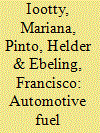| Srl | Item |
| 1 |
ID:
116737


|
|
|
|
|
| Publication |
2012.
|
| Summary/Abstract |
It is well known that poor rural households in low-income economies are reliant on traditional fuels to meet basic domestic energy needs, but little is known about the specific underlying socio-economic drivers of residential fuel choices in Ethiopia. I used the linear approximation almost ideal demand system (LAAIDS) with normalized prices to compute expenditure elasticity and a multinomial logit model (MLM) to examine household fuel use. The LAAIDS model result showed that expenditure was elastic for modern fuels, but inelastic for traditional fuels. Regression results from the MLM indicated that fuel choice behaviour of rural households could be more accurately described as 'fuel stacking' behaviour as opposed to the 'energy ladder' hypothesis. In rural areas household fuel choice may be constrained by limited access to commercial fuels and efficient cook stoves, supply dependency and affordability, consumer preferences and a web of other intricate factors. Rural households had less incentive for fuel switching due to underlying factors and the availability of fuel wood without direct financial cost. With continued deforestation and receding forests, households are expected to develop inter fuel substitution and switching behaviour conditional on access to modern energy technologies.
|
|
|
|
|
|
|
|
|
|
|
|
|
|
|
|
| 2 |
ID:
092778


|
|
|
|
|
| Publication |
2009.
|
| Summary/Abstract |
This paper aims to investigate and explain the performance of the Brazilian demand for automotive fuels in the period 1970-2005. It estimates the price and income elasticities for all the available fuels in the automotive sector in the country: gasoline, compressed natural gas (CNG), ethanol and diesel. The analysis of the expenditure allocation process among these fuels is carried out through the estimation of a linear approximation of an Almost Ideal Demand System (AIDS) model. Two estimation methods were implemented: the static (through a seemingly unrelated regression) and a dynamic (through a vector error correction model). Specification tests support the use of the latter. The empirical analysis suggests a high substitutability between gasoline and ethanol; being this relation higher than the one observed between gasoline and CNG. The study shows that gasoline, ethanol and diesel are normal goods, and with the exception of ethanol, they are expenditure elastic. CNG was estimated as an inferior good.
|
|
|
|
|
|
|
|
|
|
|
|
|
|
|
|